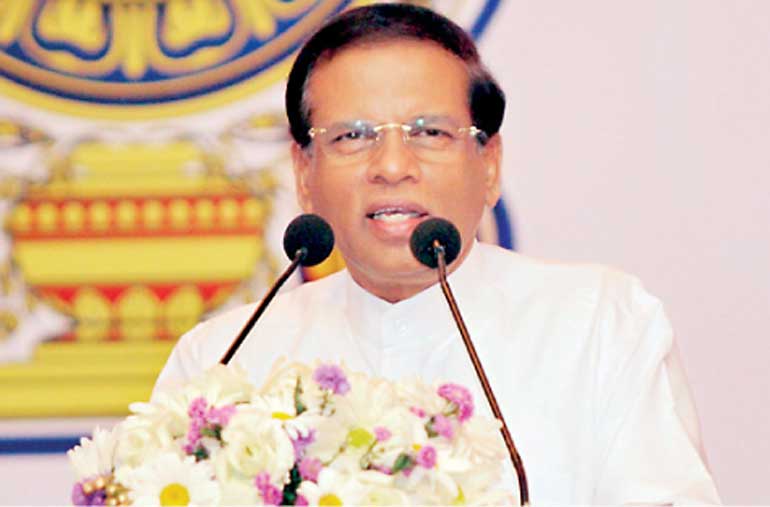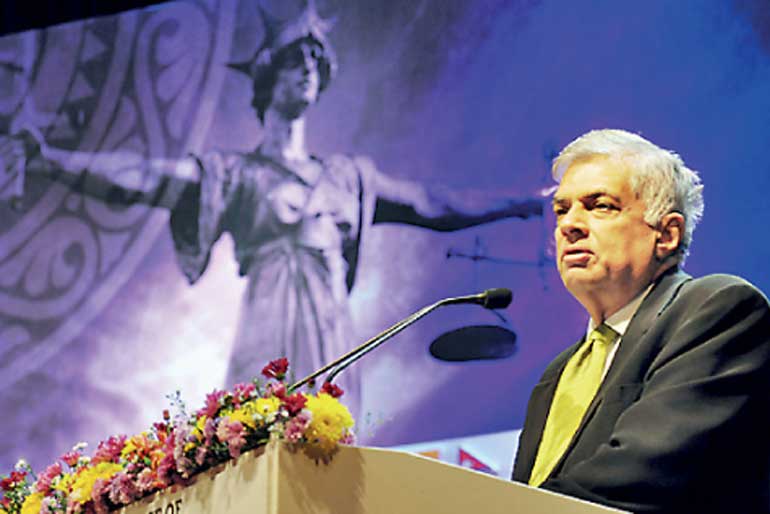Friday Feb 20, 2026
Friday Feb 20, 2026
Tuesday, 22 December 2015 00:01 - - {{hitsCtrl.values.hits}}
The much talked about Budget 2016 which was oriented towards ushering a new era, has now been passed by Parliament with a number of amendments probably deviating from Prime Minister Ranil Wickremesinghe’s policy statement and is now questioned by many in Sri Lanka over where it could continue to achieve rapid economic development to work towards the 2020, 2023 and 2030 set targets without greater reforms.

President Maithripala Sirisena
People’s expectation was national policies instead of National Government
The expectation of the 17 August Government of President Mathiripala Sirisena and Prime Minister Ranil Wickremesinghe was to first develop and agree on national policies and framework and embed them as law reforms to take this country to prosperity and to a next level of economy in Asia as a Unity Government.
We may not see another SLFP/UNP cohabitation after the next five years and if the country fails to embed the needed reforms and get the two parties to work towards some common goals, it is unwise to think that this country at least during the current generations will take off to achieve sustainable 8% or greater growth targets. Looking at the amendments, sadly most of them are targeted towards usual popular political needs, including subsidies, protectionism, and long-term unrealistic union demands without any major labour reforms insight. Therefore, it cannot be one person’s responsibility but all law makers must take the responsibility for the demanded amendments and the responsibility and outcome for the same.
Addressing the real problems: Poverty
We as citizens all must understand the current problems, it’s not only the problem of the elected 225, but will be more serious for the children of this country in the future if we miss this golden opportunity to fix them. The ordinary voter always mixes up reality with numbers and political rhetoric, the main problem of our country still remains extreme poverty to which all of us have to focus and address seriously. Whilst we talk of middle income trap and the $ 4000, the truth remain that over 40% of our fellow citizens live below $ 700 per capita income and a lower middleclass that barely exists on a day to day basis which of course leads to poor education, health and greater worker migration for low end jobs etc. This intern creates continuous uncertainty due to both political and economic risk. This is where our union leaders including professionals and the private sector have failed to understand and support a massive reform agenda. When you talk to most politicians privately, they agree that Sri Lanka needs to establish national policies in many critical areas but sadly it remains only as thoughts and words with little or no action. This may be for the pure fact that the Government is not communicating to the masses the realistic picture properly and of course for petty party political advantages as usual even though we told that we have a National Government.

Prime Minister Ranil Wickremasinghe
Balance of payments
The country is also at high risk of getting into a balance of payment crisis once again in 2016-2017 if we continue to have the budget deficit widened. There might be no option once again but to go back to IMF for a relief package. The position of foreign reserves, export performance is not healthy at all. The US economy is now kicking off and are on target to increase interest rates as done on 16 December and will no doubt have a real impact in 2016 and beyond for Asia on interest rates and exchange rates in turn creating higher debt servicing and inflationary pressure that will affect growth which Sri Lanka too is very much exposed. Therefore, even post-Budget, the Government must engage unions and all concerned to work towards a framework to increase exports, productivity linked wages and attract investment and create the conducive environment. The private sector mostly represented by chambers must talk in one voice as the chambers should not work in silos anymore as they do see the reality of a balance of payment crisis once again looming if we don’t get our act together.
Intuitional weaknesses and human resources
Structurally, most government intuitions have become very weak as a result of over two decades of politically driven directions. Even today, most decisions are taken by political leadership rather than professionals. As a country, in most cases, we have lost the era of having well-informed and experienced Government servants running ministries and departments with good subject knowledge,  judgement and needed qualifications. It still remains that even the few officials who can and have the ability to perform are not given a free hand due to nepotism in some institutions which people did not expect from the Government of 8 January. If professionals are not put to the proposed revamped institutions that will act as one stop shops, they will only end up as full stop shops.
judgement and needed qualifications. It still remains that even the few officials who can and have the ability to perform are not given a free hand due to nepotism in some institutions which people did not expect from the Government of 8 January. If professionals are not put to the proposed revamped institutions that will act as one stop shops, they will only end up as full stop shops.
The Prime Minister did address these issues in his policy statement, but as citizens we don’t see the drive and the energy towards the goals been taken seriously by the lower levels of government and people heading government establishments. The simplest message here to the Government is, if you don’t put the right people to the right ministry or institutions, Sri Lanka’s ambitious growth targets will never become a reality, and the poor will probably become poorer, a weak middleclass and a super-rich class as always will benefit from an average 5% economic growth which we will anyway achieve.
Therefore, in the interest of the country, as citizens of the country, we earnestly request the President and the Prime Minister to work closer to put in national policies and a framework during the next five years where the right people are appointed to deliver your/our vision for a better country and address the problem highlighted.
The writer is the CEO of the Shippers’ Academy Colombo, an economics graduate from the Connecticut State University USA, Senior Consultant Ports and Aviation – SEMA, past Chairman Sri Lanka Shippers’ Council, and working committee of the Global Shippers Forum (UK)